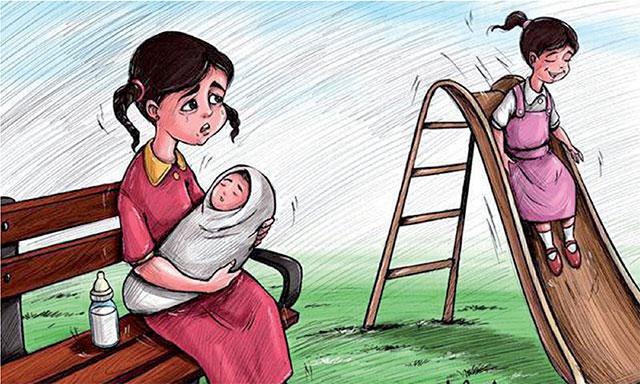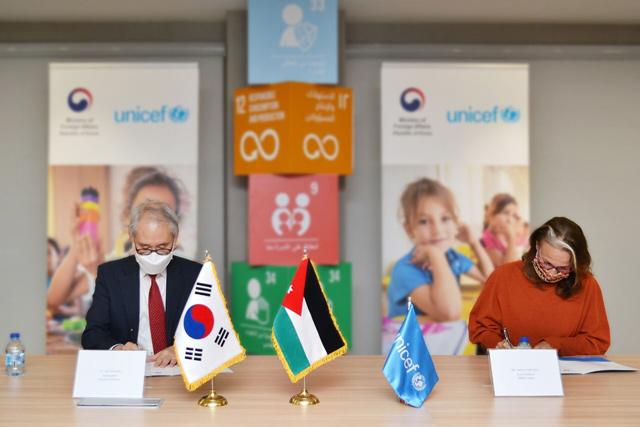You are here
Child marriage on the rise again — survey
By Sarah Abu Zaid - Jan 20,2021 - Last updated at Jan 21,2021

Data from the most recent Demographic Health Survey show that child marriage in Jordan, which had been on a declining trend for decades, seems to be on the rise again (Image courtesy of SIGI)
AMMAN — Family disintegration, poverty and lack of education are considered to be some of the key factors behind an increase in the rate of child marriage among refugees, according to UNICEF.
Customs, traditions and refugee status also contribute in child marriages, UNICEF Representative Tanya Chapuisat told The Jordan Times.
Data from the most recent Demographic Health Survey (DHS) show that child marriage in Jordan, which had been on a declining trend for decades, seems to be on the rise again.
In Jordan, more than one in four children are married before the age of 18 and nearly one in 10 are married before the age of 15, according to DHS figures.
In 2018, one in three of the newly registered marriages of Syrians in Jordan involved a child under the age of 18, which suggests that Syrian families are increasingly relying on child marriage as a coping mechanism, according to a statement from the Supreme Judge Department
Meanwhile, the trend in child divorces is also changing according to the most recent DHS data. In 2012, child divorces were the most dominant in poorest families at a rate of 4.3 per cent, and least dominant in richest families at a rate of 2.3 per cent.
Compared with 2012 statistics on child divorces, the trend had changed in 2017 findings, where child marriages were reported to end in divorce more frequently in the richest families with a rate of 6.5 per cent, with the poorest the least registering divorce cases at a rate of 3 per cent.
In Jordan, the increased rate of child marriage amongst this population group points to another negative coping mechanism for families trying to secure the economic future of their children, while reducing the economic burden on their own households, according to the UNICEF Hajati Cash Transfer Report.
Syrian refugee women also said that dwindling options and scarce resources meant that early marriage was the only “viable alternative” for daughters and their families, and they are often conducted hastily with a focus more on immediate needs, like the prospective husbands’ ability to provide financial security, according to data from the IRC and UNICEF.
Aya (not her real name), who got married and had a baby at the age of 16, considered to be a child marriage victim, insisted that she “should not be seen as a victim”.
“It is wrong what happened to me. It is really wrong. I should have finished my education first and achieved the things that I wanted. That would have allowed me to choose the right person to have a relationship with whenever I wanted. Someone who deserves me,” Aya was quoted in a UNICEF report posted on the agency’s website as saying.
Aya , who fled her home in Syria for safety in a refugee camp in Jordan, said: “What drives me to seek an education more than anything else is that my daughter needs someone to take care of her. Education is everything.”
For adolescent girls with children who want to continue their education in the camp, a UNICEF-supported nursery, implemented by partner Relief International, opened last year to help them stay in school.
It is just one of the interventions under UNICEF’s Early Childhood Development programme in Jordan, which includes support to universalise kindergarten in camps and host communities.
Facilitators in Makani centres, school teachers and counsellors, health service providers are trained on identification of and response to cases of child protection and gender-based violence, she said.
UNICEF Makani centres provide vulnerable children — both refugees and Jordanians —access to learning support services and community-based child protection
UNICEF is organising, with partners, community-based dialogue through media and social media campaigns to change the gender-based social norms. It is raising public awareness and mobilising communities for the prevention of child marriage and the empowerment of adolescent girls, Chapuisat added.
“We must address social norms through interventions if we are to reduce child marriages, also the education remains a strong preventative factor against child marriages, particularly for girls,” she said.
She highlighted the need of family support and reducing intimate partner violence.
“Child marriage threatens the lives, well-being and futures of girls, robbing them of their childhood. The pandemic has disrupted communities, putting children already at risk of violence, exploitation and abuse in even more danger,” she said.
Related Articles
AMMAN — The Government of the Republic of Korea and UNICEF signed a $2 million multi-year agreement to support the Makani programme, an inte
The practice of early marriage shows no sign of abating in Jordan, according to a study issued by UNICEF on Wednesday
AMMAN — UNICEF has procured 45,000 locally manufactured warm winter clothing kits for vulnerable children, UNICEF Jordan Representative Tany

Opinion
Apr 09, 2025
Apr 08, 2025
- Popular
- Rated
- Commented
Apr 08, 2025
Apr 09, 2025
Newsletter
Get top stories and blog posts emailed to you each day.
















